 MyDogBreeds
MyDogBreedsSerbian Mountain Hound is originated from Serbia but Doxiepoo is originated from United States. Serbian Mountain Hound may grow 25 cm / 10 inches higher than Doxiepoo. Serbian Mountain Hound may weigh 15 kg / 34 pounds more than Doxiepoo. Serbian Mountain Hound may live 3 years less than Doxiepoo. Both Serbian Mountain Hound and Doxiepoo has almost same litter size. Serbian Mountain Hound requires Low maintenance. But Doxiepoo requires Moderate maintenance
Known as the Srpski Planinski Gonic dog and coming from Yugoslavia, the Serbian Mountain Hound is one of two modern hounds that was once known as the Yugoslavian Mountain Hound or Jugoslovenski Planinski Gonic.
There isn't much information on the origins of the dogs. These two dogs are considered similar breeds, only varying in region. Its a hunting dog thought to have descended from Asian search dogs.
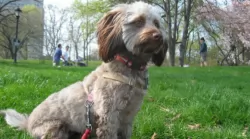 The Doxiepoo is a designer dog breed - a combination of the Dachshund who was used to hunt for Badgers and the Poodle, a dog bred in France to essentially be a lap dog. There is however some dispute as to whether the Poodle descends from Germany or from the French Barbet.
The Doxiepoo is a designer dog breed - a combination of the Dachshund who was used to hunt for Badgers and the Poodle, a dog bred in France to essentially be a lap dog. There is however some dispute as to whether the Poodle descends from Germany or from the French Barbet.
Wherever the parents hail from, the Doxiepoo hails from the United States of America.
With both the Poodle and the Dachshund being intelligent, fun and loving type of canines, the two of them together have brought out a wonderful hybrid pet in the Doxiepoo. Today, the Doxiepoo is bred with other Doxiepoos.
The Serbian Mountain Hound is about 46 to 50cm in height and weighs around 18 to 22 kilograms. This Yugoslavian hound breed has been used in Serbia as a hunting dog and they are thought to be rare outside of Serbia.
The coat of the newer Mountain Hound is fairly short and thick and mainly black with some tan marks around the paws and muzzle. The dog has floppy ears and a long tail.
This is a hardy scent hound that is confident and bold. They are used to hunting on rough terrain in the Balkan region. They are independent dogs and training and socialization will refine them, making the dog obedient and well mannered.
When he isn’t outdoors, he becomes a good-natured, gentle amiable dog that is good with children in the home.
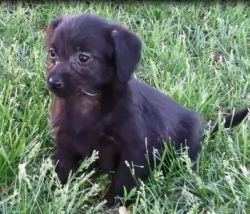 The Doxiepoo can range from being a small to medium sized dog, standing at anything between 20cm to 25cm in size and weighing between 3kg and 7kg, depending much on whether a standard, miniature or toy sized poodle was used in the breeding.
The Doxiepoo can range from being a small to medium sized dog, standing at anything between 20cm to 25cm in size and weighing between 3kg and 7kg, depending much on whether a standard, miniature or toy sized poodle was used in the breeding.
The Doxiepoo could look like either one of the two breeds, but he will have a strong, sturdy body with a curly or wavy coat of varying lengths and various colors - cream, black, tan, apricot, grey or white. The poodle side of him ensures he is a hypoallergenic dog.
Between the Dachshund and the Poodle, you’re going to get a wonderful array of characteristics as they both come with their strong points. Certainly you will be well entertained and amused by your pet, while he can also be useful as a watchdog.
Being a small dog, he will fit well into life in the city or in the countryside. He is as bright as a button and learns tricks and new skills quickly. With training and socialization he becomes obedient and well behaved wherever he is, getting on well with other pets in the home as well as with all children and adults.
The Doxiepoo is a lively, alert, energetic dog and will require being exercised – lots of ball games and a walk will keep him lean, muscular and content.
The Serbian Mountain Hound is such a social, happy, friendly kind of dog that he makes a wonderful family pet.
He learns well, he likes to please, he gets on well with children and dogs in the home, he is independent and not a noisy barker. He is also fairly low maintenance.
Take good care of him and you’re guaranteed to have a wonderful pet and companion.
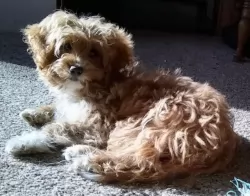 Every dog, even the little ones like this, will require some kind of input from you if you want to get the best from him. Every puppy bought as a gift when they’re cute and cuddly turns into an adult, and often the very person who received him as a gift, loses interest and neglects him. Then they wonder why the dog becomes irritating and destructive.
Every dog, even the little ones like this, will require some kind of input from you if you want to get the best from him. Every puppy bought as a gift when they’re cute and cuddly turns into an adult, and often the very person who received him as a gift, loses interest and neglects him. Then they wonder why the dog becomes irritating and destructive.
A dog is a long term investment and if you commit to your sweet Doxiepoo, you’ll get years and years of devoted friendship.
Nobody wants their dog to be sick and lethargic, after all they are our best friend’s. Some ways to check the status of your dog’s health -
Check his breath, as a bad breath, just like as with a human being, can be a sign of illness. It can also be indicative of dental problems, digestive or kidney problems.
Spread his fur and check that the skin is a healthy color – pink, grey or black. Make sure there is no crusting or itching with red, inflamed areas. Make sure the coat is thick and lustrous – not falling out and thinning.
Make sure the nails aren’t split, flaking and broken and that the paws aren’t cut so that the dog is constantly licking them.
Every dog drinks a lot of water after hectic exercise, but if your dog suddenly becomes very thirsty more than usual, it could be indicating a medical problem, and you will need to discuss it with your vet.
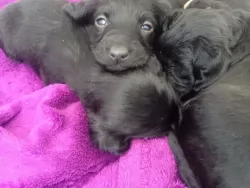 The life expectancy of the Doxiepoo is around 12-15 years of age if he is well looked after. He is a robust dog, but he can still face some health issues that both his parents contend with.
The life expectancy of the Doxiepoo is around 12-15 years of age if he is well looked after. He is a robust dog, but he can still face some health issues that both his parents contend with.
Just some of the diseases that the Doxiepoo might face while in your care are ear- and skin infections, dental disease, digestive tract problems, heart conditions and epilepsy. If you think your pet has any kind of illness, it is imperative to get him to the vet for a checkup.
Poodles, particularly are prone to skin disorders. They can be allergic to grass, parasites and food. If your Doxiepoo chews or licks his paws or some other area a lot, and the skin is red, he could have a skin allergy.
The vet will be able to diagnose your dog’s allergies with some skin- or blood testing. For instance, sebaceous adenitis is an inherited allergy that affects the lubrication of the skin and hair follicles. Symptoms of the disease include scaly skin, sore and even hair loss.
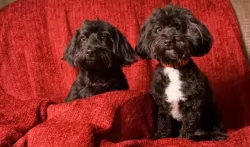 You can’t be sure what kind of coat your Doxiepoo will have but he will certainly require brushing at least twice a week. In some instances it may be wise to seek out the services of a professional groomer who does an excellent job of trimming the hair, cleaning the teeth, checking the ears and clipping the nails.
You can’t be sure what kind of coat your Doxiepoo will have but he will certainly require brushing at least twice a week. In some instances it may be wise to seek out the services of a professional groomer who does an excellent job of trimming the hair, cleaning the teeth, checking the ears and clipping the nails.
The Doxiepoo, just like any other dog, will need to be trained and socialized early as he is a stubborn dog and will need to be trained to be obedient. With this training and socialization, he becomes amicable around children and pets in the home. He learns easily too and this is what makes him a great pet for first time dog owners.
The Doxiepoo is a moderate energy dog, so he will do well on a walk every day. You can also make use of ropes, balls and frisbees to give him a bit of a workout in the garden.
He loves water too and will enjoy a run on the beach and cooling off in the ocean. He adapts easily to life in the city or in the country, so long as he is with his human companions.
The Doxiepoo will eat dry kibble, particularly if it is from the highest quality brands and chosen according to the dog’s size, age and activity levels.
Now and then you can add in a little bit of cooked rice, vegetables and chicken for variety. Some raw meat can play an important role in keeping the skin healthy and free from dryness and itchiness. Make sure that he always has fresh, cool water available to him.